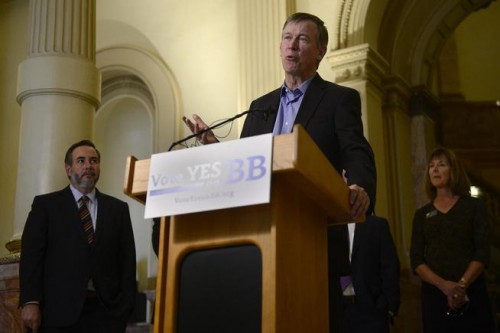The low-profile statewide ballot measure that arrives in mailboxes this week is focused on a familiar political debate about what constitutes a tax hike — an argument that is causing friction among conservatives.
The question Colorado voters will answer in the November election is how to handle $66.1 million of recreational marijuana taxes collected in the first year of legalization.
The options outlined in Proposition BB are clear: Allow lawmakers to spend the money, with $40 million going to school construction and the remainder to other programs, or refund a $25 million portion to taxpayers and $41 million to marijuana growers and users.
2015 vote
Change in plans: Denver sets 2015 ballot, without marijuana social use initiative
NEW: Get podcasts of The Cannabist Show.
Subscribe to our newsletter here.
Watch The Cannabist Show.
The measure’s opponents argue that allowing the state to spend the money represents a tax increase. The potent message adds a brighter political glare to the debate and is likely to trouble conservative voters, despite overwhelming Republican support for the measure in the General Assembly.
The most prominent opponent is Americans for Tax Reform, the Grover Norquist-led group based in Washington that opposes all tax hikes. The organization has remained relatively quiet on the issue but plans to make to take a more prominent stance in coming weeks.
“It has the same impact as a tax increase, as passage would mean that Colorado residents keep less of their income than would’ve otherwise been the case,” said Patrick Gleason, the organization’s state affairs director.
Proposition BB supporters dispute the argument because the ballot question doesn’t create a new tax or raise an existing one. Colorado approved taxes on recreational marijuana in 2013 by an overwhelming 65 percent to 35 percent vote on Proposition AA.
State Sen. Pat Steadman, a Denver Democrat who crafted Proposition BB, said opponents’ rationale “is more about political rhetoric than what happens in the real world.”
“To me that’s not a very valid line of thinking because the money was generated by the tax rate people approved,” he said.
The ballot question is necessary because the Taxpayer’s Bill of Rights, known as TABOR, requires the state to estimate how much money the new marijuana taxes would generate and the total state revenue for the first year of taxation. The tax estimate hit the target, but the total revenue projection for fiscal year 2015 fell short, largely because the state’s economy improved more quickly than anticipated. The situation forced lawmakers to put a measure on the ballot, or issue a refund.

Douglas Bruce, a disgraced former state lawmaker and the author of TABOR, voiced opposition to the measure at a recent legislative hearing in which he suggested that if the state kept the money it is “in effect a $66 million tax increase.” He said the refund is necessary “as a penalty” for giving bad information to voters in the 2013 vote on the tax rates.
The state’s official ballot information booklet — the “blue book” mailed to all voters — echoes Bruce’s criticism in outlining the argument against the measure. “Proposition BB is effectively a temporary tax increase,” it reads.
The line drew concern from Rep. Polly Lawrence, a Republican House leader, at the Legislative Council hearing in September. The bipartisan committee added language to the blue book to emphasize that the tax money already had been collected. “This amendment just clarifies that this is not a tax increase,” she said, explaining the move.
In a recent interview, Lawrence said she is getting questions about the ballot measure and thought it needed more explanation. “The voters spoke very loudly when they passed Amendment 64 — they wanted the first $40 million (in recreational pot taxes) to go to school construction, so we are trying to fulfill the requirement of our constitution,” the Douglas County lawmaker said.
Not all critics are making the argument that the measure is a tax hike.
Mike Krause at the Independence Institute, a Denver-based advocacy organization that supports limited government, questioned whether the measure meets the definition of a tax increase.
Still, the Independence Institute opposes the measures because it earmarks spending on specific programs that the group considers unsustainable.
“I would call it a spending increase,” he said. “I don’t know about an actual tax increase.”
John Frank: 303-954-2409, jfrank@denverpost.com or @ByJohnFrank
About Proposition BB
The November 2015 ballot includes a statewide measure asking for voters’ permission to spend $66.1 million in recreational marijuana taxes collected in the first months of legalization. Ballots will begin arriving in mailboxes this week.
A “YES/FOR” vote is a vote in favor of allowing the state to keep the tax money and spend it. A “NO/AGAINST” vote would require the state to refund it, the bulk of which would be refunded to marijuana users and growers with a portion returned to all taxpayers.
The ballot question
May the state retain and spend state revenues that otherwise would be refunded for exceeding an estimate included in the Ballot Information Booklet for Proposition AA and use these revenues to provide 40 million dollars for public school building construction and for other needs, such as law enforcement, youth programs, and marijuana education and prevention programs, instead of refunding these revenues to retail marijuana cultivation facilities, retail marijuana purchasers and other taxpayers?
